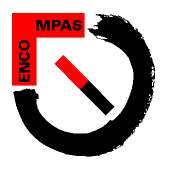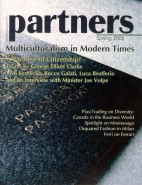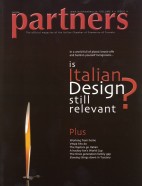

 Die
Italienische Handelskammer in Toronto
Die
Italienische Handelskammer in Toronto

|
Frühjahr 2005: How many cultures do you "speak"? The vocabulary and grammar of intercultural communication (Part I) In the first of a 2-part article, Alexia Petersen takes a different perspective on globalisation. Where are the synergies we all talk about, and how do we tap into them? What are the risks of realising only a small fraction of the potential? As opposed to merely being multicultural, becoming intercultural is an essential skill required to meet the real challenges of living in a global village. |

|
Sommer 2005: How many cultures do you "speak"? The vocabulary and grammar of intercultural communication (Part II) In this second of a 2-part article, Alexia Petersen continues to examine how culture shapes and shades our cross-cultural dialogue. On a global scale of communication styles, she looks at what happens when two fundamentally opposite cultural paradigms look at and talk to each other. |

|
Winter 2006: The Many Hierarchies of International Business: Are You Prepared? The facts and figures of daily business are neutral, but the people who discuss them and make the decisions are decidedly not. Business is done entirely in a cultural context, and business people carry with them a heavy load of baggage. Cross-cultural miscommunication, however, doesn't always have to end problematically, though this can often be the case. Beginning with this first instalment of a new column, Alexia Petersen, a Canadian trainer and consultant of intercultural communication living in Germany, examines some facets of international business communication that are frequently overlooked but which become obvious... once one knows where to look. |

|
Spring 2006: Your Passage to India India is a major player in the global services revolution, and is consistently ranked first in studies analysing the attractiveness of offshore locations. It is no longer just the destination of choice for offshore call centres, software development, or credit card billing. Indian companies read X-rays, handle basic tax returns, test pharmaceutical products, process legal documents, and even grade exam papers for North American and European customers. Western business professionals often say they have considerable problems communicating with Indian business partners even though both sides speak English fluently. This is due to a number of differences in communication style. Let's have a look at the most common intercultural differences you need to be aware of when you make that first trip. |

|
Sommer 2006: Talking to Italians All roads lead to Rome - but which is the best way to communicate with Italians? - This question crossed my mind as I sat at the Alitalia boarding gate waiting for my flight from Toronto to Düsseldorf via Milan. I was mesmerised by a dark-hair young man in the middle of the room who was talking animatedly in Italian into his mobile phone, fingers gesticulating emphatically to make his point, first standing up, then sitting down and pulling his knees up to rock gently in his seat. As a Canadian living in Germany and a frequent traveller to Italy, I always enjoy observing and interacting with other communication styles across cultures vastly different from my own. |

|
Herbst 2006: Mexico - Where Taking it Personally is Good for Business Though geographically North American, Mexico sits on the far side of a wide linguistic and cultural divide apart from the rest of the continent. Cultural differences that often result in opposing work styles between Mexicans and English-speaking North Americans prove often to be the most difficult part of doing business, even when perfect language skills are at hand. Communicating effectively with Mexicans requires building context, not just with facts, but through a personalised relationship nuanced by shades of grey. |

|
Winter 2007: Germany - Where Doing Business is all Business (Part I) International business, especially where joint ventures, prolonged negotiations, or multicultural project teams are involved, is fraught with difficulties. We expect cultural differences to play a major role in how we work with Arabs, Mexicans or East Asians, but often overlook or under-estimate some profound differences between such traditionally compatible business communication cultures as Germany and Canada, and how these impact the way they work together. |

|
Frühjahr 2007: Germany - Where Doing Business is all Business (Part II) According to Foreign Affairs and International Trade Canada, Germany is Canada's sixth-largest export market and ranks sixth among Canada's suppliers. Canadian imports from Germany rose from $3.83 billion in 1990 to $10.26 billion in 2005, while Canadian exports rose from $2.20 billion in 1990 to $3.23 billion in 2005. With such impressive numbers, it's never been more important for Canadian businesspeople - so comfortable with casual North American business communication norms - to understand what it means to talk the talk in Germany's boardrooms. |

|
Sommer 2007: When East Meets West - Business Communication with the Japanese I recently attended a symposium organized by several high-tech start-ups near Düsseldorf that addressed the issues and hurdles encountered by German companies as they attempt to enter the international market. I was struck in particular by the glowing reports of one particular speaker, the CEO of a biomedical spinoff of a local university institute, who waxed confidently of the positive strides they were making. |

|
Frühjahr 2008: Doing Business in Sweden Legend has it that Scandinavian Vikings, when concluding their assemblies, would pass around a bowl of mead to share when group consensus was reached on a particular issue. Each would be careful to drink only enough to quench his thirst, while leaving enough for the others as the bowl went laget om, "around the group." Folklore may seem to paint a quaint picture of earthy harmony contrary to the iconic image we have today of the fearsome marauders. However, if there is one word up to the task of describing the Scandinavian mentality today it would be the shortened "lagom," meaning collective restraint and moderation. Contained in this anecdote of balance and moderation is the ancillary value of Scandinavians and especially the Swedish - equality. |
| Letzte Änderung dieser Seite: 10.07.2008 |
Copyright © 1999-2019 A. & S. Petersen www.aspetersen.de |